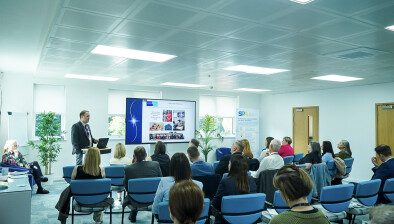Almost half of Scots believe COVID-19 is an opportunity to transform economy
Almost half of Scots (48%) agree that there is now an opportunity to make Scotland’s economy stronger and fairer, according to Cooperative Development Scotland’s survey into the effects of COVID-19 on businesses in Scotland.

The survey also found that under-35-year-olds are more even more likely to agree (59%), while 64% said that the pandemic has already made their business more socially responsible.
When asked what should be the top priority for businesses going forward, three out of four people said protecting jobs (74%), followed by staff wellbeing (67%) and creating innovative solutions to problems (53%).
The survey, which had over 1,230 respondents, was commissioned by Co-operative Development Scotland (CDS), the arm of Scotland’s enterprise agencies that supports company growth through employee ownership and co-operative business models.
CDS is launching a new campaign to showcase the role inclusive business models can play in supporting the Scottish Government with its aim to create a fairer, stronger and more democratic economy.
Clare Alexander, head of co-operative development Scotland, said: “While discussions on the social aspects of the economy have become more vocal in recent years, COVID-19 has undoubtedly fuelled its relevance and urgency. The world has been shaken, many of our norms have been questioned and as this survey shows, there is a desire not to return to life as before.
“Business leaders have prioritised wellbeing, communities have responded to help and support each other and new and innovative ways of being economically viable have come to the fore. There has also been a focus on a collective, rather than individual, call to action. Employee ownership, community ownership and consortium co-operatives are effective examples of plural ownership that can help us drive that necessary change across our business communities and support is available to make it happen.”
This approach to business is at the heart of the Scottish Government’s Programme for Government, which recognises the critical benefits of Community Wealth Building - a people-centred approach to local economic development which redirects wealth back into the local economy and places control and benefits into the hands of local people. The models promoted by CDS are effective examples of plural ownership, one of the five pillars of Community Wealth Building deemed integral to effect the necessary change for local communities and national wellbeing.
The Scottish Government has also just announced a drive looking for ideas to help inform the work of its Advisory Board on Social Renewal, which is tasked with building on the positive policy and practice shifts seen during COVID-19 to tackle disadvantage and poverty, and advance equality and social justice.
Jamie Hepburn MSP, minister for business, fair work and skills, added: “COVID-19 has had a massive impact on the global economy and Scotland, like all countries, has been deeply affected. This forces us not just to respond in the immediate term, but also to make choices about the sort of economy we want to have and to focus our efforts on building back fairer and stronger.
“We are committed to ensuring everyone can access work that is fair and offers flexibility and opportunity for all, and recognise the benefits of community wealth building – economic development that ensures local people and businesses have a genuine stake in producing, owning and enjoying the wealth they create.
“As this survey shows, the pandemic has increased the importance businesses place on social responsibility. To help protect jobs and improve staff wellbeing, it is important that we build on that and keep these initiatives going.”
Two out of three (66%) Scots are pessimistic about the future of the economy following the COVID-19 pandemic. In addition over one in three said job security was a concern, followed by over one in four saying closures of local amenities such as shops and pubs was a worry.
Clare Alexander added: “The economic and social potential of community business is significant, and could be more widely adopted in Scotland. Combined with the greater community spirit that has been cultivated during COVID-19, now is the perfect time to champion community business models and the wider economic, social and environmental benefits they can deliver.”
With 33% of Scots stating that working collaboratively with other businesses should be a priority, CDS is advising business owners to consider the advantages of formally joining together via the consortium co-operative model. These are established when businesses come together for a shared purpose; to buy or sell in scale, market more effectively, share facilities or jointly bid for contracts.
Ms Alexander continued: “We know collaboration has been a vital part of the response to the pandemic, so formalising a consortium co-operative could be an effective, low risk way for businesses to improve market presence and achieve new goals whilst retaining their independence.”
“Whilst businesses with plural ownership have experienced many of the same challenges around job retention, cash flow and uncertainty as others during the pandemic, they are often more resilient, putting them in a strong position to either weather the economic storm or to recover well afterwards. During the initial response to the pandemic many of these businesses were able to unite behind a common goal, helping their ability to adapt and innovate during the crisis.”







